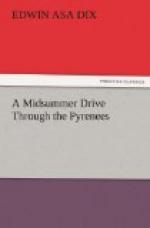We are soon in Irun once more, and after change of cars, cross to Hendaye, and baggage is inspected for France. The train goes on its way north, but we stay in Hendaye, to lunch, and to make our projected excursion to Fuenterrabia.
In terms of logic, San Sebastian the modern has in Fuenterrabia the ancient its full “contradictory.” The one, the resort, is affirmative and universal; the other, the old, strange town, is negative and individual. The one has told us little of old Spain; we turn hopefully to the other.
Fuenterrabia lies near the mouth of the Bidassoa, on the Spanish side of the stream, below Irun. It is but two miles, from Irun, and readily reached from that place by carriage; from Hendaye, on the French side, one reaches it by row-boat in about the same time, with the additional zest and boast of recrossing the river and of entering and leaving Spain once more.
II.
Luncheon past, we walk up the long, easy incline that leads from Hendaye station into its town; and with a turn to the left find our way through its streets down again to the river bank. Here are boats and boatmen, and we have to run the customary gauntlet of competition, as vociferous at Hendaye as at Killarney or the Crossmon. We elect two of the competitors as allies, and the rest become our sworn enemies forthwith.
The tide is low, the water still and shallow; and we are sculled smoothly out into the stream, restful in the soft sunshine, the full blue of the afternoon sky. The voices of our hundred enemies recede; the sounds from the town yield to the dripping oars; soon the stream stretches its silent width about us. Close-grouped on the opposite shore we see the dark walls of Fuenterrabia, domineered by the castle. The railway whistle begins to seem a memory of another existence, the bustle of travel a thing remote. The quiet of the river, unlike Lethe, turns us to the past, and clouds the present in a dreamy haze.
“In that sunny corner where the waves of the Bay of Biscay wash over a sandy barrier and mingle with the waters of the Bidassoa stream,”—thus runs the legend so charmingly recounted in The Sun-Maid,—“they tell the ancient story that a favored mortal won from the gods permission to ask three blessings for Spain.
“He asked that her daughters might be beautiful, that her sons might be brave, and that her government might be good.
“The first two requests were granted,—the beauty of a Spanish woman is of world-wide renown; and if the men are rash, passionate, and revengeful, at least they are brave; but the last request was refused.
“‘Impossible!’ was the answer; ’impossible! Already she is an earthly paradise, and were this last blessing hers, the very gods themselves would desert Elysium and come down to dwell in Spain.’”
Of this we think, winding among the shallows, as the Spanish bank comes nearer, and the boat at last grounds lightly on its soil. Before us is the old town we are seeking,—a type perhaps of the nation itself, in its courtly unthrift, its proud misgovernance.




